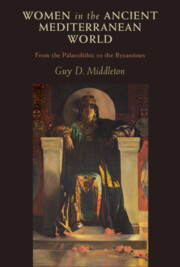Book contents
- Women in the Ancient Mediterranean World
- Women in the Ancient Mediterranean World
- Copyright page
- Dedication
- Epigraph
- Contents
- Preface
- Acknowledgements
- Timeline
- Historical Contexts
- Introduction
- Part I The Deep Past
- Part II The Bronze Age
- Part III The Iron Age
- Part IV The Hellenistic Worlds
- 20 Olympias
- 21 Seianti Hanunia Tlesnasa
- 22 Terentia
- 23 Mariamne
- Part V The Age of Empire
- Notes
- Select Bibliography
- Index
21 - Seianti Hanunia Tlesnasa
from Part IV - The Hellenistic Worlds
Published online by Cambridge University Press: 19 January 2023
- Women in the Ancient Mediterranean World
- Women in the Ancient Mediterranean World
- Copyright page
- Dedication
- Epigraph
- Contents
- Preface
- Acknowledgements
- Timeline
- Historical Contexts
- Introduction
- Part I The Deep Past
- Part II The Bronze Age
- Part III The Iron Age
- Part IV The Hellenistic Worlds
- 20 Olympias
- 21 Seianti Hanunia Tlesnasa
- 22 Terentia
- 23 Mariamne
- Part V The Age of Empire
- Notes
- Select Bibliography
- Index
Summary
In a brief article from the 1960s, Herbert Mentink wrote that ‘I have yet to come upon a writer who can refrain from such adjectives as amazing, fascinating, mysterious, baffling, enigmatic, puzzling, and ambiguous when he speaks of the Etruscans’.1 Usually this mystery extends both to their origins and language. Did they really come all the way from the eastern Mediterranean to Italy as legend had it or were they an indigenous culture that bound themselves into a wider culture? The Etruscan language, unrelated to any other European language, is represented by 11,000-odd surviving inscriptions but remains undeciphered.2 Their tendency to luxury and debauchery, their sensual habit of removing all body hair, and their unique way of doing things from boxing to bread-making and flogging to flute music were proverbial in ancient times and made the Etruscans oddities to the Greeks and Romans, from whose viewpoints we have come to know them.3 They were also known for their ‘religious expertise’, especially haruspicy, the bloody art of divination from animal innards.4 The Roman emperor Claudius was fascinated by them and even wrote a history of them, very sadly lost.5
- Type
- Chapter
- Information
- Women in the Ancient Mediterranean WorldFrom the Palaeolithic to the Byzantines, pp. 172 - 178Publisher: Cambridge University PressPrint publication year: 2023

